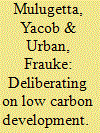|
|
|
Sort Order |
|
|
|
Items / Page
|
|
|
|
|
|
|
| Srl | Item |
| 1 |
ID:
101425


|
|
|
|
|
| Publication |
Amsterdam, Elsevier, 2010.
|
|
|
|
|
|
|
|
|
|
|
|
|
|
|
|
| 2 |
ID:
093508


|
|
|
|
|
| Publication |
2010.
|
| Summary/Abstract |
Energy-related CO2 emissions in South Korea have increased substantially, outpacing those of Organisation for Economic Co-operation and Development (OECD) countries since 1990. To mitigate CO2 emissions in South Korea, we need to understand the main contributing factors to rising CO2 levels as part of the effort toward developing targeted policies. This paper aims to analyze the specific trends and influencing factors that have caused changes in emissions patterns in South Korea over a 15-year period. To this end, we employed the Log Mean Divisia index method with five energy consumption sectors and seven sub-sectors in terms of fuel mix (FM), energy intensity (EI), structural change (SC) and economic growth (EG). The results showed that EG was a dominant explanation for the increase in CO2 emissions in all of the sectors. The results also demonstrated that FM causes CO2 reduction across the array of sectors with the exception of the energy supply sector. CO2 reduction as a function of SC was also observed in manufacturing, services and residential sectors. Furthermore, EI was an important driver of CO2 reduction in most sectors except for several manufacturing sub-sectors. Based on these findings, it appears that South Korea should implement climate change policies that consider the specific influential factors associated with increasing CO2 emissions in each sector.
|
|
|
|
|
|
|
|
|
|
|
|
|
|
|
|
| 3 |
ID:
101429


|
|
|
|
|
| Publication |
2010.
|
| Summary/Abstract |
Low carbon development (LCD) is a much used word in development circles today. As such, governments are actively exploring how to achieve their growth targets through a low carbon trajectory or even through a 'carbon neutral' pathway. This is a new area that challenges how development has been done so far, calling for not only a serious rethink of old practices but also contesting entrenched value systems. In this viewpoint, we explore some of the underlying issues that are driving the process of mainstreaming climate change in development. Recognising that there are variations in LCD, we map out the diversity of understandings and interpretations with a view to lay out the range of possibilities that countries can consider. We argue that whilst countries should certainly draw lessons from the experiences of others on mainstreaming climate change in their policies and practices, the version of LCD that each country follows needs to emerge from within its own national reality, anchored in its development prospects, aspirations and capacities.
|
|
|
|
|
|
|
|
|
|
|
|
|
|
|
|
| 4 |
ID:
113497


|
|
|
|
|
| Publication |
2012.
|
| Summary/Abstract |
Modern energy access in Africa is critical to meeting a wide range of developmental challenges including poverty reduction and the Millennium Development Goals (MDGs). Despite having a huge amount and variety of energy resources, modern energy access in the continent is abysmal, especially Sub-Saharan Africa. Only about 31% of the Sub-Saharan African population have access to electricity while traditional biomass energy accounts for over 80% of energy consumption in many Sub-Saharan African countries. With energy use per capita among the lowest in the world, there is no doubt that Africa will need to increase its energy consumption to drive economic growth and human development. Africa also faces a severe threat from global climate change with vulnerabilities in several key areas or sectors in the continent including agriculture, water supply, energy, etc. Low carbon development provides opportunities for African countries to improve and expand access to modern energy services while also building low-emission and climate-resilient economies. However, access to finance from different sources will be critical in achieving these objectives. This paper sets out to explore the financial instruments available for low carbon energy access in Africa including the opportunities, markets and risks in low carbon energy investments in the continent.
|
|
|
|
|
|
|
|
|
|
|
|
|
|
|
|
| 5 |
ID:
107932


|
|
|
|
|
| Publication |
2011.
|
| Summary/Abstract |
The negotiating group of developing countries, the G77, is one of the most important institutions in global climate governance. This article analyses the cohesiveness of, and internal tension within, the G77 coalition by using the politics of climate change as the empirical window. The study examines four arenas of UN-based deliberations on climate change in the years 2007-2010; the Security Council, the Commission on Sustainable Development, the General Assembly and the United Nations Framework Convention on Climate Change (UNFCCC). We argue that these deliberations, once they reached the top of the international political agenda in 2007, and ever since, have posed deeper challenges to the G77 coalition than ever before. While developing country interests are both converging and diverging, the increasingly conflicting interests, as well as the very slowly eroding common identity, are creating increasingly unified subgroups in the G77. The G77 is highly unlikely to break up formally, but how functional it will be as a bloc in the forthcoming climate change negotiations remains an open question.
|
|
|
|
|
|
|
|
|
|
|
|
|
|
|
|
| 6 |
ID:
113489


|
|
|
|
|
| Publication |
2012.
|
| Summary/Abstract |
The discussion to widen access to modern energy services has been influential in shaping some of the discussions on energy at the international level. The practice of widening modern energy services access to the poor in Africa is complex, and exacerbated by the dual nature of the energy system across Sub-Saharan Africa where traditional and modern energy systems and practices co-exist. This presents major challenges for policy makers who have to contend with a fragmented energy system, which requires the mobilisation of an array of actors at cross-sectoral levels in order to develop effective institutions and implement innovative policy frameworks. This paper further argues that, the 'energy access' discussion needs to take place in the context of energy transitions, giving due consideration to the productive sector as an important vehicle for change. As the link between energy and development is context specific, each African country needs to chart its own energy transition pathway into the future, and there are ample lessons that they can draw from previous energy transitions.
|
|
|
|
|
|
|
|
|
|
|
|
|
|
|
|
|
|
|
|
|